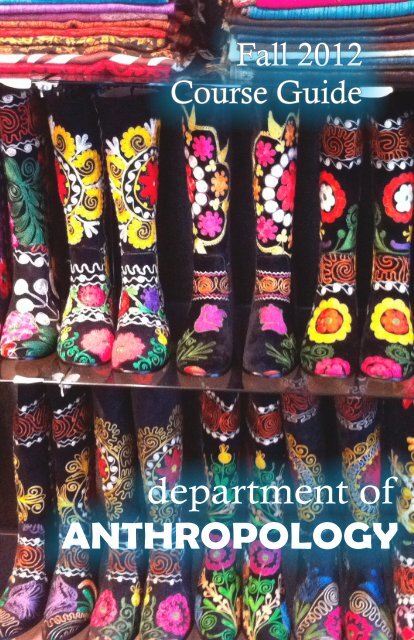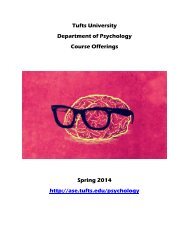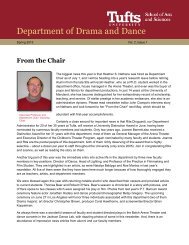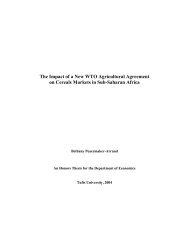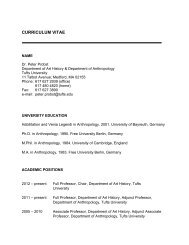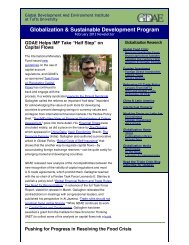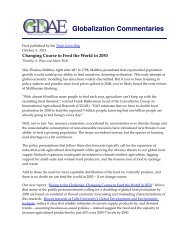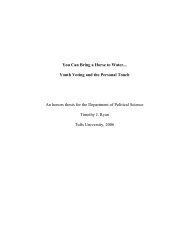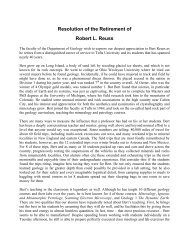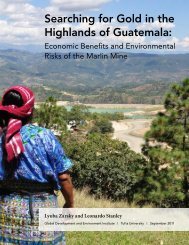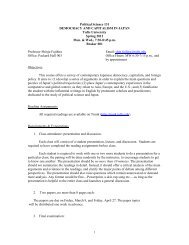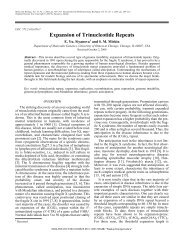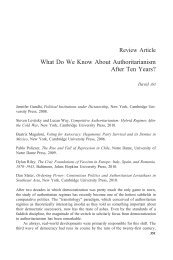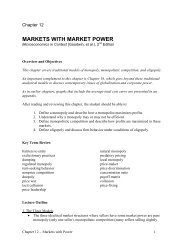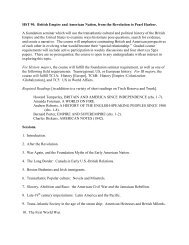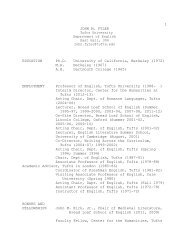department of anthropology - Tufts University
department of anthropology - Tufts University
department of anthropology - Tufts University
Create successful ePaper yourself
Turn your PDF publications into a flip-book with our unique Google optimized e-Paper software.
Fall 2012<br />
Course Guide<br />
<strong>department</strong> <strong>of</strong><br />
<strong>anthropology</strong>
<strong>anthropology</strong> at tufts<br />
Anthropologists study global human experience, combining<br />
social, cultural, biological, archaeological, and linguistic<br />
approaches within a single discipline. Anthropological questions<br />
and topics are very diverse. We examine, for example, the meanings<br />
<strong>of</strong> Arab hip-hop, the social nature <strong>of</strong> suffering, how political and<br />
legal structures shape emotional life in South Asia, the relationship<br />
between culture and human rights, the globalization <strong>of</strong> armed<br />
conflict, art and cultural ownership, indigenous rights in contexts<br />
<strong>of</strong> environmental destruction in South America, the cultural and<br />
evolutionary shaping <strong>of</strong> human physiques, the global flows <strong>of</strong><br />
“World Music,” nationalist uses <strong>of</strong> archaeology, the consequences<br />
<strong>of</strong> bilingualism, local experiences <strong>of</strong> post conflict intervention in<br />
Africa, and the intersection <strong>of</strong> transnational diasporas with U.S.<br />
notions <strong>of</strong> “race.”<br />
While in the past <strong>anthropology</strong> was typically the study <strong>of</strong><br />
non-Western societies, today anthropologists also work “at<br />
home”—wherever in the world that “home” is. Our course <strong>of</strong>ferings<br />
reflect both our global approach and our concern with domestic<br />
and local issues. They also reflect the longstanding anthropological<br />
practice <strong>of</strong> combining a concern with “local voices” with the need<br />
to situate those voices socially, historically, and politically. <strong>Tufts</strong> is<br />
distinguished for its public <strong>anthropology</strong> initiative, in which faculty<br />
and students focus on key public concerns and/or engage with<br />
communities and audiences outside the academy.<br />
Anthropology at <strong>Tufts</strong> provides students not only with a strong<br />
background in critical thinking, analysis, and writing, but also<br />
with first-hand experience through field research. The combination<br />
<strong>of</strong> disciplinary breadth, global and local understanding, hands-on<br />
research, and public engagement makes a major in Anthropology an<br />
extremely strong preparation for graduate school and a wide range<br />
<strong>of</strong> careers. Training in <strong>anthropology</strong> can give you a foundation, for<br />
example, for documentary production, museum work, advertising,<br />
humanitarian and development work, community organizing,<br />
journalism, medicine, and law.<br />
Cover Photo: Boots, by Deborah Pacini Hernandez
f a l l 2 0 1 2 c o u r s e s<br />
ANTH 16 Introduction to Latino Cultures*<br />
Deborah Pacini Hernandez H+ TR 1:30-2:45 PM<br />
ANTH 25 Anthropology <strong>of</strong> War and Peacemaking<br />
Thomas Abowd L+ TR 4:30-5:45 PM<br />
ANTH 27 Human Rights in Cultural Context<br />
Amahl Bishara F+ TR 12:00-1:15 PM<br />
ANTH 50 Prehistoric Archaeology<br />
Lauren Sullivan M+ MW 6:00-7:15 PM<br />
ANTH 99 Internship<br />
ANTH 126 Food, Nutrition, and Culture<br />
Stephen Bailey E+ MW 10:30-11:45 AM<br />
ANTH 130 Anthropological Thought<br />
Cathy Stanton K+ MW 4:30-5:45 PM<br />
ANTH 132 Myth, Ritual, & Symbol<br />
Cathy Stanton I+ MW 3:00-4:15 PM<br />
ANTH 149-19 Questioning Kinship: Sexuality & Gender in South Asia*<br />
Sarah Pinto D+ TR 10:30-11:45 AM<br />
ANTH 163 Latinos in the Cinematic Imagination<br />
Deborah Pacini Hernandez 2 W 9:00-11:30 AM<br />
ANTH 164 Media, The State, and the Senses<br />
Amahl Bishara 7+ W 1:20-4:20 PM<br />
ANTH 182 Human Physique<br />
Stephen Bailey 12+ W 6:00-9:00 PM<br />
ANTH 184 Festival & Politics in Latin America<br />
David Guss 5+ M 1:20-4:20 PM<br />
ANTH 190/191 Directed Reading<br />
ANTH 197 Directed Research<br />
ANTH 198 Apprenticeship<br />
ANTH 199 Senior Honors Thesis<br />
*starred courses count towards the Anthropology area course requirement
f a c u l t y<br />
David Guss | Pr<strong>of</strong>essor | Chair<br />
david.guss@tufts.edu | Eaton Hall Room 305<br />
Urban and aesthetic <strong>anthropology</strong>, theory, cultural performance, myth and<br />
ritual, popular culture, placemaking, Latin America<br />
Stephen Bailey | Associate Pr<strong>of</strong>essor<br />
stephen.bailey@tufts.edu | Eaton Hall Room 307<br />
Biological and nutritional <strong>anthropology</strong>, growth and body composition,<br />
methodology, Latin America, China, Southwestern U.S.<br />
Amahl Bishara | Assistant Pr<strong>of</strong>essor<br />
amahl.bishara@tufts.edu | Eaton Hall Room 304<br />
Media, human rights, the state, knowledge production, Middle East,<br />
politics <strong>of</strong> place and mobility, expressive practices<br />
Deborah Pacini Hernandez | Pr<strong>of</strong>essor<br />
deborah.pacini@tufts.edu | Eaton Hall Room 309<br />
Comparative Latino studies, racial and ethnic identity, popular music,<br />
globalization, transnationalism, Latino community studies<br />
Sarah Pinto | Associate Pr<strong>of</strong>essor<br />
sarah.pinto@tufts.edu | Eaton Hall Room 308<br />
Medical <strong>anthropology</strong>, gender, reproduction, social and feminist theory,<br />
caste, political subjectivity, India, U.S.<br />
Rosalind Shaw | Associate Pr<strong>of</strong>essor *on leave 2012-2013*<br />
rosalind.shaw@tufts.edu | Eaton Hall Room 311B<br />
Transnational justice, the <strong>anthropology</strong> <strong>of</strong> mass violence, local and transnational<br />
practices <strong>of</strong> redress and social repair, child and youth combatants,<br />
social memory, Atlantic slave trade, ritual and religion, West Africa, Sierra<br />
Leone<br />
Cathy Stanton | Lecturer<br />
cathy.stanton@tufts.edu | Eaton Hall Room 305<br />
History and memory, cultural performance, heritage, tourism, myth and<br />
ritual<br />
Lauren Sullivan | Lecturer<br />
lauren.sullivan@umb.edu | Eaton Hall Room 305<br />
Mesoamerican archaeology, Mayan archaeology, the rise and fall <strong>of</strong><br />
complex societies, prehistory <strong>of</strong> the American Southwest, Peleoindians <strong>of</strong><br />
North America, human evolution, cultural <strong>anthropology</strong>, ceramic analysis
d e p a r t m e n t i n f o<br />
THE ANTHROPOLOGY MAJOR<br />
Ten courses distributed as follows:<br />
1. One Gateway (introductory) sociocultural <strong>anthropology</strong> course<br />
(ANTH 05-39)<br />
2. One Gateway biological <strong>anthropology</strong> or archaeology course<br />
(ANTH 40-59)<br />
3. ANTH 130 Anthropological Thought<br />
4. Seven additional Anthropology courses, at least one <strong>of</strong> which must be an<br />
area-focused course numbered below 160 (gateway or mid-level),<br />
and two <strong>of</strong> which must be upper-level seminars (160-189).<br />
We strongly recommend taking Anthropology 130 in the junior year.<br />
A maximum <strong>of</strong> two courses cross-listed in other <strong>Tufts</strong> <strong>department</strong>s may be<br />
counted toward the Anthropology major.<br />
Students must achieve a grade <strong>of</strong> C- or better for a course to count for<br />
credit toward the major.<br />
The <strong>department</strong> encourages majors to explore the possibility <strong>of</strong> undertaking<br />
a senior thesis.<br />
DECLARING A MAJOR<br />
Any full-time faculty member <strong>of</strong> the <strong>department</strong> can be your advisor. Try<br />
to meet with as many <strong>of</strong> the faculty members as possible to talk about<br />
your own goals and expectations. Select an advisor who seems most<br />
attuned to your interests. Pick up and fill out the blue “Declaration <strong>of</strong><br />
Major” form from the <strong>department</strong> and have your new Anthropology advisor<br />
sign it. Take the signed blue form to our Staff Assistant to photocopy<br />
for our files. Deliver the signed blue form to the Student Services Desk<br />
in Dowling Hall. You have now <strong>of</strong>ficially declared a major and henceforth<br />
relevant documents (transcripts, pre-registration packets, etc.) will come<br />
to your new advisor.<br />
DOUBLE MAJORS<br />
The same blue form should be used to declare a second major. Your folder<br />
will have to go to your advisors in both <strong>department</strong>s so have the <strong>department</strong><br />
make an additional copy for the second <strong>department</strong>.
c o u r s e d e s c r i p t i o n s<br />
ANTH 16 Introduction to Latino Culture<br />
Deborah Pacini Hernandez H+ TR 1:30-2:45 PM<br />
This course surveys the social and<br />
cultural histories <strong>of</strong> the various<br />
Latino communities currently<br />
residing in the United States.<br />
Students will analyze a variety<br />
<strong>of</strong> important issues affecting US<br />
Latinos, such as immigration,<br />
bilingual education, citizenship<br />
and political participation, race,<br />
class, gender, ethnicity and<br />
representations in the media. This<br />
course counts toward the Social<br />
Sciences distribution requirement,<br />
the World Civilization requirement,<br />
and the Hispanic Culture and<br />
Diasporas option.<br />
ANTH 25 Anthropology <strong>of</strong> War and Peacemaking<br />
Thomas Abowd L+ TR 4:30-5:45 PM CLST: PJS 25<br />
Introductory-level study <strong>of</strong> armed conflict and conflict transformation from<br />
standpoint <strong>of</strong> <strong>anthropology</strong> <strong>of</strong> violence. Critical examination <strong>of</strong> causes <strong>of</strong> conflict;<br />
gendered, ethnic, cultural, and religious dimensions; globalization <strong>of</strong> conflict<br />
through media, transnational flows <strong>of</strong> commodities, international interventions;<br />
impact <strong>of</strong> 9/11 and<br />
the global “war on<br />
terror”; intersection<br />
<strong>of</strong> local, national,<br />
and international<br />
techniques <strong>of</strong> conflict<br />
transformation. Focus<br />
in depth on experience<br />
and initiatives from<br />
the ground up.<br />
This course counts<br />
toward the Social<br />
Sciences distribution<br />
requirement.
ANTH 27 Human Rights in Cultural Context<br />
Amahl Bishara F+ TR 12:00-1:15 PM CLST: PJS 27<br />
This gateway course examines anthropological debates about human rights. It<br />
introduces key anthropological methods, like participant observation, reflexivity,<br />
and cultural critique, and anthropological theories on topics like culture, the<br />
state, indigenous peoples, and globalization. We will analyze controversies<br />
about cultural relativism and<br />
universalism, approaches to<br />
both violent conflicts and the<br />
structural violence <strong>of</strong> poverty,<br />
and the relationship between<br />
<strong>anthropology</strong> and human rights.<br />
We also study ethnographies<br />
<strong>of</strong> human rights work that<br />
elucidate how advocates strive<br />
to produce reliable knowledge<br />
and circulate it to authorities<br />
and the public in reports,<br />
documentaries, and other<br />
media. This course counts<br />
toward the Social Sciences<br />
distribution requirement<br />
and the World Civilization<br />
requirement.<br />
© Ali Farzat<br />
ANTH 50 Prehistoric Archaeology<br />
Lauren Sullivan M+ MW 6:00-7:15 PM CLST: ARCH 30<br />
Survey <strong>of</strong> human culture from the earliest paleolithic hunters and gatherers to<br />
the formation <strong>of</strong> states and the beginnings <strong>of</strong> recorded history. Course provides<br />
an introduction to archaeological methods, a worldwide overview <strong>of</strong> prehistoric<br />
ways <strong>of</strong> life, and a more detailed analysis <strong>of</strong> cultural development in the New<br />
World. This course counts toward the Social Sciences distribution requirement<br />
and the World Civilization requirement.<br />
ANTH 99 Internship in Anthropology<br />
Staff ARR<br />
Prerequisite: Permission <strong>of</strong> instructor; Anthropology Majors only.<br />
Register in Eaton 302.<br />
Supervised internship in wide range <strong>of</strong> community organizations, health organizations,<br />
museums, governmental and non-governmental organizations. Twelve to<br />
fifteen hours work per week. Written assignments, with supporting readings, to<br />
place internship in critical analytical frame. This course counts toward the Social<br />
Sciences distribution requirement.
ANTH 126 Food, Nutrition, and Culture<br />
Stephen Bailey E+ MW 10:30-11:45 AM<br />
Interplay <strong>of</strong> the act <strong>of</strong> eating with its biological and cultural correlates. Topics<br />
include subsistence strategies, sex differentials in food intake, and the nutritional<br />
impact <strong>of</strong> modernization; hunger<br />
and malnutrition in the developing<br />
world; historical and symbolic<br />
attributes <strong>of</strong> food, including taboo,<br />
valences, and national cuisines, with<br />
a focus on Chinese and American.<br />
Relation <strong>of</strong> normal and abnormal<br />
eating behavior to gender and<br />
cultural norms <strong>of</strong> attractiveness.<br />
The rise <strong>of</strong> industrial and fast foods,<br />
with an emphasis on McDonald’s.<br />
Cultural meanings <strong>of</strong> fusion foods.<br />
Haute cuisines. Comparisons <strong>of</strong><br />
East Asian cuisines, particularly Chinese and Japanese, to those <strong>of</strong> America and<br />
Europe. This course counts toward the Social Sciences distribution requirement.<br />
ANTH 130 Anthropological Thought<br />
Cathy Stanton K+ MW 4:30-5:45 PM<br />
Prerequisite: One <strong>anthropology</strong> course and junior standing, or permission <strong>of</strong><br />
instructor.<br />
This course on the history <strong>of</strong> anthropological theory begins with the premise that<br />
<strong>anthropology</strong> is as much a way <strong>of</strong> thinking as an academic discipline. By engaging<br />
theories, debates, and primary sources from the anthropological canon from the<br />
late 19th century to the present,<br />
we will try to understand<br />
what questions have been <strong>of</strong><br />
enduring concern to anthropologists<br />
and also how this<br />
way <strong>of</strong> thinking has shifted<br />
over time. Through regular<br />
written responses, studentled<br />
discussions, and investigation<br />
into current trends and<br />
practices in the field, students<br />
will be encouraged to see<br />
themselves as participants in<br />
a long-running dialogue about<br />
theory and method that has<br />
<strong>of</strong>ten had implications in the societies anthropologists inhabit as well as those we<br />
study. This course counts toward the Social Sciences distribution requirement.
ANTH 132 Myth, Ritual, & Symbol<br />
Cathy Stanton I+ MW 3:00-4:15 PM CLST: REL 134<br />
Prerequisite: Sophomore standing<br />
Myth, ritual, and symbol exist in all human societies and play key roles in<br />
helping people to comprehend, function within, and re-shape their worlds.<br />
Mythography--the study <strong>of</strong> these topics--can deeply enrich our sense <strong>of</strong> human<br />
possibility and creativity. This course will explore some <strong>of</strong> the specific ways<br />
in which myths, rituals, and<br />
symbols serve to organize<br />
societies, integrate individuals,<br />
facilitate change, and explain<br />
and maintain our connection to<br />
the world. Along the way, we<br />
will examine some <strong>of</strong> the ways<br />
in which anthropologists and<br />
others have explained myth,<br />
ritual, and symbol, including<br />
functionalist, historicalgeographic,<br />
psychoanalytical,<br />
feminist, discursive, and<br />
ecological approaches. Drawing on the work <strong>of</strong> Victor Turner and others, we<br />
will investigate liminality, shamanism, initiation, and performance. We will also<br />
ask how myths become located in bodies and landscapes, and how they relate to<br />
tourism--a characteristic and arguably universal ritual <strong>of</strong> modernity. Finally, the<br />
course will address the ever-changing relationship <strong>of</strong> myth and science, and will<br />
consider how the generative power <strong>of</strong> mythopoesis is operating within contested<br />
narratives about anthropogenic climate change. This course counts toward the<br />
Social Sciences distribution requirement.<br />
ANTH 149-19 Questioning Kinship: Sexuality & Gender in South Asia<br />
Sarah Pinto D+ TR 10:30-11:45 AM<br />
Students may not enroll in this course if they have previously received credit for<br />
ANTH 120.<br />
This course explores the diversity <strong>of</strong> family life, gender arrangements, and forms<br />
<strong>of</strong> sexuality in South Asia by looking at the cultural, religious, legal and historical<br />
dimensions <strong>of</strong> contemporary life. We will focus on questions <strong>of</strong> social change and<br />
continuity as they relate to gender and sexuality and represent the ever-changing<br />
nature and negotiations <strong>of</strong> kinship in India, Pakistan, Bangladesh, Sri Lanka,<br />
and Nepal. In asking how marriage practices, sexual identities, the politics <strong>of</strong><br />
sex-work, and concepts <strong>of</strong> gender norms are in a state <strong>of</strong> flux, we will adopt a<br />
“case-study” approach. This will include looking at issues such as the repeal <strong>of</strong><br />
anti-homosexuality legislation, the status and mobilization <strong>of</strong> sex-workers, the<br />
political impact <strong>of</strong> Third Sex, debates over a Uniform Civil Code, and issues such as<br />
dowry, romantic love, changing kinship structures, and their relationship to caste<br />
and class. This course counts toward the Social Sciences distribution requirement.
ANTH 163 Latinos in the Cinematic Imagination<br />
Deborah Pacini Hernandez 2 W 9:00-11:30 AM C-LST: AMER 180-01<br />
Prerequisite: Junior standing.<br />
Since the inception <strong>of</strong> the U.S.<br />
film industry, Latinos have been<br />
(mis)represented in Hollywood<br />
feature films intended primarily<br />
for non-Latino audiences. In<br />
the first part <strong>of</strong> this course,<br />
students will analyze images <strong>of</strong><br />
Latinos constructed in Hollywood<br />
films, from the silent era to the<br />
present; subsequently students<br />
will analyze contemporary<br />
work (1980-present) by Latino<br />
directors, producers, screenwriters and actors, who have produced films about<br />
their own communities contesting the negative stereotypes typical <strong>of</strong> Hollywood<br />
films with more accurate and complex images <strong>of</strong> their histories and cultures.<br />
Weekly viewings <strong>of</strong> films by and about Latinos will introduce students to the most<br />
important historical and cultural milestones in Latino film making, demonstrating<br />
how film-makers <strong>of</strong> different ethnic/national backgrounds have used cinematic<br />
images to express their views on selected issues relevant to the Latino experience.<br />
This course counts toward the Social Sciences distribution requirement and the<br />
Hispanic Culture and Diasporas option.<br />
ANTH 164 Media, The State, and the Senses<br />
Amahl Bishara 7+ W 1:20-4:20 PM<br />
This upper level seminar examines the social practices <strong>of</strong> media production, circulation,<br />
and reception. Media are both the products <strong>of</strong> and means for social, cultural,<br />
and political transformation. In studying<br />
media, we will examine their relationship<br />
to transformations <strong>of</strong> space-time perceptions,<br />
the shaping <strong>of</strong> political identities,<br />
and the constitution <strong>of</strong> complex (social,<br />
political, economic, institutional, and/<br />
or creative) connections among people<br />
and groups. How are media mobilized<br />
by states to consolidate powers? How<br />
do people challenge these authorities’<br />
attempts? Media also work on the senses,<br />
even as individuals and institutions seek<br />
to limit how they do so. In this class, we<br />
will attend to the possibilities and limitations<br />
<strong>of</strong>fered by different media, due to<br />
their material forms, institutional structures, and perceptual forms. Students will<br />
have the opportunity to conduct brief media ethnographies. This course counts<br />
toward the Social Sciences distribution requirement.
ANTH 182 Human Physique<br />
Stephen Bailey 12+ W 6:00-9:00 PM<br />
Prerequisite: Anthropology 40 or permission <strong>of</strong><br />
instructor.<br />
Our bodies as adaptive biological landscapes.<br />
Growth from conception to early adulthood.<br />
Genetic and intrauterine determinants <strong>of</strong><br />
prenatal growth and birth size; impact <strong>of</strong><br />
extreme environments, under nutrition, and<br />
disease on size and shape. Puberty and sexual<br />
dimorphism. Quantitative assessment <strong>of</strong> body<br />
composition. Interplay between biological<br />
and cultural bodies in the construction <strong>of</strong><br />
attractiveness, and its evolutionary significances.<br />
This course counts toward the Natural<br />
Science distribution requirement.<br />
ANTH 184 Festival and Politics in Latin America<br />
David Guss 5+ M 1:20-4:20<br />
Prerequisite: Junior standing or permission <strong>of</strong> instructor.<br />
This course will explore the various expressions and functions <strong>of</strong> festive behavior<br />
throughout Latin America, considering public performance within a religiously<br />
sanctioned context as a principal mode <strong>of</strong> articulation for differing ethnic and<br />
political groups in emerging non-Western nations. Issues <strong>of</strong> cultural reproduction,<br />
hegemony, resistance, inversion, gender, and ethnicity will all be discussed as part<br />
<strong>of</strong> the multi-faceted and contested reality incorporated within festive expression.<br />
Attention will also be paid to the aesthetic religious devotion to ones <strong>of</strong> nationally<br />
staged events. And finally, the course will focus, throughout all <strong>of</strong> these discussions,<br />
on issues <strong>of</strong> authenticity, tradition, and invention. Such manifestations as<br />
Qoyllur Rit’i in Peru, Umbanda and Carnival in Brazil, the Gran Poder in Bolivia,<br />
Rumba in Cuba, and Corpus Christi and San Juan celebrations throughout the<br />
continent will be investigated. This course counts toward the Social Sciences<br />
distribution requirement, the World Civilization requirement, and the Hispanic<br />
Culture option.<br />
ANTH 190/191 Directed Reading<br />
ANTH 197 Directed Research<br />
ANTH 198 Apprenticeship<br />
ANTH 199 Senior Honors Thesis<br />
Please see <strong>department</strong>al web site for specific details.<br />
Prerequisites: Permission <strong>of</strong> Instructor.<br />
Register in Eaton 302.<br />
Back Photo: Tchotchkes, by Deborah Pacini Hernandez
tufts <strong>University</strong><br />
Department <strong>of</strong><br />
<strong>anthropology</strong><br />
302 Eaton Hall<br />
Medford, MA 02155<br />
617.627.6528 TEL<br />
617.627.6615 FAX<br />
ase.tufts.edu/<strong>anthropology</strong>


